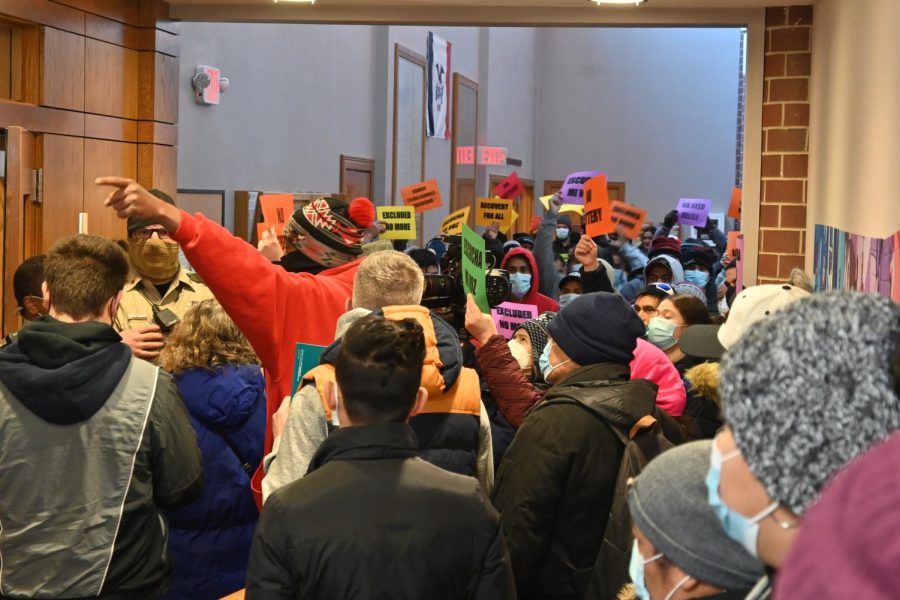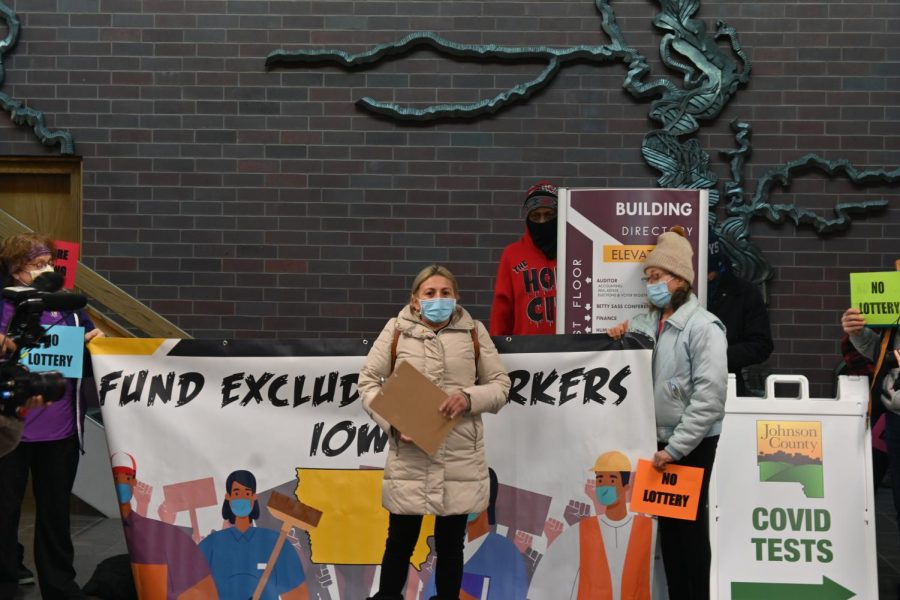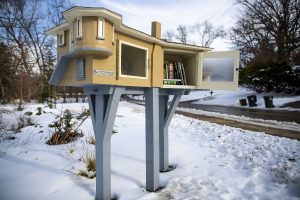Protesters challenge lottery distribution of county COVID-19 relief funds, urge prioritizing excluded workers
Protesters rallied Monday night at the Johnson County Board of Supervisors joint entities meeting, demanding changes to how the county disperses the American Rescue Plan funds allocated for low-income residence.
Excluded worker protesters express anger when learn they can’t go inside the room or speak to the Board of Supervisors during a meeting in the Johnson County Administration Building on Monday, Jan. 24, 2022.
January 24, 2022
Protesters gathered outside the boardroom of the Johnson County Board of Supervisors joint entities meeting on Monday night, calling for the county to provide more resources for excluded workers through American Rescue Plan funding.
Before the meeting, the Fund Excluded Workers Coalition, which advocates for direct payments to workers who have not received other funds from federal pandemic relief payments, requested 10 minutes on the meeting’s agenda to voice concerns about the program. The group called the county’s direct assistance plan an “exclusionary, casino-style lottery system” in an open letter directed to the Joint Entities of Johnson County.
Excluded workers include undocumented immigrants and previously incarcerated people.
During Monday’s meeting, around 150 protesters stood in the doorway of the boardroom holding signs that read “no lottery” and “no more stalling.”
Board of Supervisors Chair Royceann Porter called the meeting into a recess in the middle of the joint entities’ introductions, and deputies from the Johnson County Sheriff’s Office escorted members of the coalition away from the doorway so that the meeting could proceed. People continued the protest outside of the board room. Supervisors complained the noise was too loud and the protesters needed to be escorted out.
Once introductions resumed, a member of the public watching via Zoom could be heard interjecting multiple times saying “the protesters deserve to be heard,” before being removed from the Zoom.
Iowa City Mayor Bruce Teague said the need for COVID-19 relief in the community is present.
“I know that there’s a lot of individual groups that have many needs,” he said. “But I think making sure that we acknowledge the needs of all of our community and moving forward together is going to be very important.”
The Iowa City City Council recently announced plans to transfer $1.5 million from its American Rescue Plan Act funding to Johnson County’s Direct Assistance Program through a lottery system where county officials randomly select applicants.
The total offered through the fund is now $3.5 million after a vote by the Johnson County Board of Supervisors to invest $2 million from the county’s American Rescue Plan funds for COVID-19 relief. To apply for assistance, people must meet certain income and employment requirements.
According to the coalition’s letter, the group is demanding several changes to the distribution of the federal funding from the county including:
- The county fully funding the Direct Assistance Program, which the letter stated is at least $32 million to distribute $2,000 checks to 16,000 people.
- End the lottery and put excluded workers first.
- Include self-certification options for excluded workers to prove their income, impact from the pandemic, and exclusion from relief from prior months. “Paperwork must be kept to a minimum or excluded workers will be left out yet again,” the letter said.
- Operate the Direct Assistance Program in-house and distribute funds directly to the excluded workers.
- Promptly meet with the coalition and the county’s ARPA team to discuss the program.
Emily Sinnwell, a member of the Iowa City Catholic Worker House who was protesting in solidarity with the coalition, said she wishes the supervisors followed their policy when it comes to public comment.
“We asked for public comment a week ago, the policy is 24 hours in advance,” she said. “We came tonight and asked for public comment and they denied us again, so I think it’s unfair.”
Rosemary Andino, an Iowa City resident protesting at the meeting, said she hopes future meetings allow an opportunity for protesters to comment.
“Why not give us a chance to speak of what we are in need of help?” Andino said. “We need to be just like everybody else and treated with respect.”





